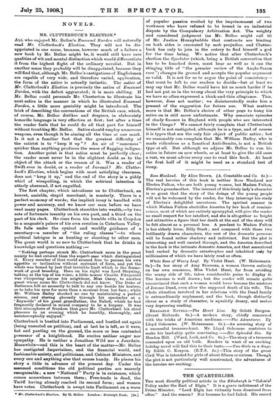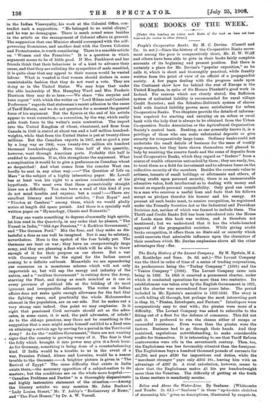THE QUARTERLIES.
Tax most directly political article in the Edinburgh is "Colonial Policy under the Earl of Elgin." It is a grave indictment of the Prime Minister. "Lord Elgin has virtually been dismissed from office." And the reason? Not because he had failed. His record in the Indian Viceroyalty, his work at the Colonial Office, con- tradict such a supposition. "He belonged to no social clique," and he was no demagogue. There is much sound sense besides in the article on the management of Colonial affairs in general. The suggestion that one Minister should correspond with the self- governing Dominions, and another deal with the Crown Colonies and Protectorates, is worth considering. There is a sensible article on "Women and the Franchise." It is a question in which argument seems to be of little good. If Mrs. Pankhnrst and her friends think that their behaviour is of a kind to advance their cause, and that they are enlisting the sympathies of male mankind, it is quite clear that any appeal to their reason would be wasted labour. What is wanted is that women should declare in some unmistakable fashion that they do not want a vote. They are doing so in the United States. We may hope that under the able leadership of Mrs. Humplary Ward and Mrs. Frederic Harrison they may do so here.—We share "the surprise and keen regret" with which the writer on "Lord Milner and Canadian Preference" regards that statesman's recent adhesion to the cause of Tariff Reform, and we do not question for a moment the general force of his argument. But the figures at the end of his article appear to want correction,—a correction, by the way, which really adds fresh force to the writer's main contention. The import into the United Kingdom of wheat, wheatmeal, and flour from Canada in 1006 is stated at about ten and a half million hundred- weights, while that from the United States is put at twenty-three millions. But the Canadian exports in 1907, not so good a year by a long way as 1906, were twenty-two million six hundred thousand hundredweights. More than half of this quantity, however, went through American ports. Probably this half is credited to America. If so, this strengthens the argument. What a complication it would be to give a preference on Canadian wheat so despatched ! And what comes from the remoter West can hardly be sent in any other way.—" The Question of Life on Mars" is the subject of a highly interesting paper. Mr. Lowell has at least won his right to a serious consideration of his hypothesis. We must own that these geometrically straight lines are a difficulty. You can have a road of this kind if you do not mind trouble and expense, but a canal !—There are excellent literary and historical articles, "Port Royal" and " Anoka at Cambrai " among them, which we would gladly notice at length did space permit. And there is a specially well written paper on "Hymnology, Classic and Romantic."
If any one wants something to depress abnormally high spirits, let him read in the Quarterly, in any order that he pleases, "The Unrest in India," "Old-Age Pensions," "A Reckless Government," and "The German Peril." Mix the four, and they make as dis- tasteful a dose as can well be imagined. But it may be salutary, nevertheless. Here is the upshot of the four briefly put. The Germans are bent on war ; they have an overpoweringly large army, and they are planning a fleet which will be able to throw enough of it for their purpose on our shores. But a war with Germany would be the signal for the Indian unrest coining to a definite outbreak. Meanwhile we are squandering our resources on a monstrous scheme which will not only impoverish us, but will sap the energy and industry of the nation, and a "reckless Government" is cutting down the Army, starving the Fleet, and doing as much mischief as it can in every province of political life at the bidding of its most ignorant and irresponsible adherents. The writer on Indian affairs does not make quite enough allowance for the fact that the fighting races, and practically the whole Mohammedan element in the population, are on our side. But he makes out a very strong case indeed. One point we may emphasise. Is it right that pensioned Civil servants should act as the advo- cates, in some cases, it is said, the paid advocates, of rebels ? As to the old-age pensions, may there not be something in the suggestion that a man might make himself entitled to a fixed sum on attaining a certain age by serving for a period in the Territorial Army ? As for the "reckless Government," there are not wanting signs that the country is growing weary of it. The fear is that the folly which brought it into power may give it a fresh lease. As for Germany, something is being done of a counterbalancing kind. If India would be a trouble to us in the event of a war, Prussian Poland, Alsace and Lorraine, would be a nearer trouble to the Germans.—A brighter picture is given in "The Revival of Egypt." The same difficulty that exists in India exists there,—the necessary opposition of a subject-nation to its masters ; but the conditions are on the whole more hopeful.— " Canadian Problems and Parties" is a thoroughly dispassionate and highly instructive statement of the situation.—Among the literary articles we may mention Mr. John Buchan's "Lady Louisa Stuart," Mr. T. Ashby's "Rediscovery of Rome," and "The First Homer," by Dr. A. W. Verrall.







































 Previous page
Previous page